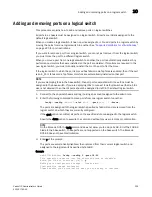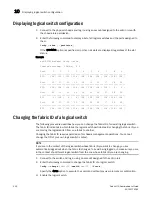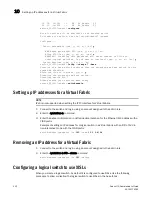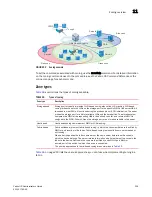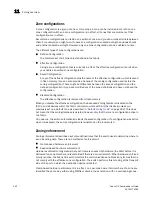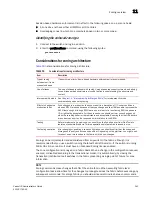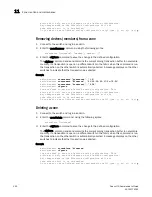
238
Fabric OS Administrator’s Guide
53-1001763-02
Zoning overview
11
•
QoS zones
Assign high or low priority to designated traffic flows. QoS zones are normal zones with
additional QoS attributes specified by adding a QOS prefix to the zone name. See
“QoS:
SID/DID traffic prioritization”
on page 403 for more information.
•
Traffic Isolation zones (TI zones)
Isolate inter-switch traffic to a specific, dedicated path through the fabric. See
“Traffic Isolation
Zoning”
on page 267 for more information.
Zoning overview
NOTE
The information in this chapter applies to Brocade Native mode only. For information about zoning
in InteropMode 2 or 3, see
Chapter 14, “Interoperability for Merged SANs”
.
Zoning enables you to partition your storage area network (SAN) into logical groups of devices that
can access each other. A device can communicate only with other devices connected to the fabric
within its specified zone. For example, you can partition your SAN into two zones,
winzone
and
unixzone
, so that your Windows servers and storage do not interact with your UNIX servers and
storage. When zoning is enabled, devices that are not included in a zone configuration are
inaccessible to other devices in the fabric.
Zones can be configured dynamically. They can vary in size, depending on the number of
fabric-connected devices, and devices can belong to more than one zone. Because zone members
can access only other members of the same zone, a device not included in a zone is not available
to members of that zone.
When using a mixed fabric—that is, a fabric containing two or more switches running different
release levels of fabric operating systems—you should use the switch with the highest Fabric OS
level to perform zoning tasks.
You can use zones to logically consolidate equipment for efficiency or to facilitate time-sensitive
functions; for example, use zoning to create a temporary zone to back up nonmember devices.
Any zone object connected to the fabric can be included in one or more zones. Zone objects can
communicate only with objects within the same zone. For example, consider
Figure 32
on
page 239, which shows configured zones, Red, Green, and Blue.
•
Server 1 can communicate only with the Loop 1 devices.
•
Server 2 can communicate only with the RAID and Blue zone devices.
•
Server 3 can communicate with the RAID device and the Loop1 device.
•
The Loop 2 JBODs are not assigned to a zone; no other zoned fabric device can access them.
Summary of Contents for 53-1001763-02
Page 1: ...53 1001763 02 13 September 2010 Fabric OS Administrator s Guide Supporting Fabric OS v6 4 0 ...
Page 4: ...iv Fabric OS Administrator s Guide 53 1001763 02 ...
Page 24: ...xxiv Fabric OS Administrator s Guide 53 1001763 02 ...
Page 28: ...xxviii Fabric OS Administrator s Guide 53 1001763 02 ...
Page 32: ...xxxii Fabric OS Administrator s Guide 53 1001763 02 ...
Page 40: ...xl Fabric OS Administrator s Guide 53 1001763 02 ...
Page 42: ...2 Fabric OS Administrator s Guide 53 1001763 02 ...
Page 54: ...14 Fabric OS Administrator s Guide 53 1001763 02 High availability of daemon processes 1 ...
Page 74: ...34 Fabric OS Administrator s Guide 53 1001763 02 Basic connections 2 ...
Page 102: ...62 Fabric OS Administrator s Guide 53 1001763 02 Audit log configuration 3 ...
Page 214: ...174 Fabric OS Administrator s Guide 53 1001763 02 Management interface security 7 ...
Page 228: ...188 Fabric OS Administrator s Guide 53 1001763 02 Brocade configuration form 8 ...
Page 276: ...236 Fabric OS Administrator s Guide 53 1001763 02 Creating a logical fabric using XISLs 10 ...
Page 404: ...364 Fabric OS Administrator s Guide 53 1001763 02 ...
Page 440: ...400 Fabric OS Administrator s Guide 53 1001763 02 Performance data collection 17 ...
Page 480: ...440 Fabric OS Administrator s Guide 53 1001763 02 F_Port masterless trunking 19 ...
Page 494: ...454 Fabric OS Administrator s Guide 53 1001763 02 Buffer credit recovery 20 ...
Page 574: ...534 Fabric OS Administrator s Guide 53 1001763 02 Hexadecimal overview E ...






